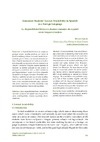Please use this identifier to cite or link to this item:
https://accedacris.ulpgc.es/jspui/handle/10553/58619
| DC Field | Value | Language |
|---|---|---|
| dc.contributor.author | Sandu, Bianca | en_US |
| dc.date.accessioned | 2019-12-16T18:32:38Z | - |
| dc.date.available | 2019-12-16T18:32:38Z | - |
| dc.date.issued | 2013 | en_US |
| dc.identifier.issn | 2340-9274 | en_US |
| dc.identifier.other | Dialnet | |
| dc.identifier.uri | https://accedacris.ulpgc.es/handle/10553/58619 | - |
| dc.description.abstract | La disponibilidad léxica es un campo que persigue conocer aquellas palabras que vienen de forma inmediata y natural a la mente cuando la con-versación gira en torno a una serie de estímulos ver-bales. Nuestra investigación se centra en el vocabu-lario disponible de doscientos ochenta estudiantes de colegios e institutos bilingües rumano-españoles de Bucarest. El objetivo principal de este estudio es averiguar si los factores ‘sexo’ y ‘haber visitado un país hispanohablante’ inciden en el léxico disponible de español como lengua extranjera. El análisis cuan-titativo y cualitativo de cada una de estas variables, junto con su correlación con el ‘nivel de estudios’, saca a la luz resultados destacados cuya explicación solo puede encontrarse en otras disciplinas, como son la sociolingüística o las ciencias cognitivas. | en_US |
| dc.description.abstract | Lexical availability is an area of knowl-edge which aims at discovering those words which come immediately and naturally to our mind when the conversation turns on a series of stimuli. Our research focuses on the available vocabulary of two hundred and eighty students from Romanian-Spanish bilingual primary schools and high-schools from Bucharest. The main objective of this study is to ascertain whether the factors ‘gender’ and ‘having visited a Spanish-speaking country’ affect lexical availability in Spanish as a foreign language. The quantitative and qualitative analy-sis of each of these variables, together with their correlation with the ‘degree of competence’, brings to light outstanding results whose explanation can only be found by turning to other disciplines, such as sociolinguistics or cognitive sciences. | en_US |
| dc.language | eng | en_US |
| dc.relation.ispartof | Estudios interlingüísticos | en_US |
| dc.source | Estudios interlingüísticos [ISSN 2340-9274] (1), p. 121-133 | en_US |
| dc.subject | 57 Lingüística | en_US |
| dc.subject | 58 Pedagogía | en_US |
| dc.subject.other | Disponibilidad léxica | en_US |
| dc.subject.other | Interdisciplinariedad | en_US |
| dc.subject.other | Enseñanza del español como lengua extranjera | en_US |
| dc.subject.other | Sociolingüística | en_US |
| dc.subject.other | Ciencias cognitivas | en_US |
| dc.subject.other | Léxico-estadística | en_US |
| dc.subject.other | Lexical availability | en_US |
| dc.subject.other | Interdisciplinarity | en_US |
| dc.subject.other | Teaching Spanish as a foreign language | en_US |
| dc.subject.other | Sociolinguistics | en_US |
| dc.subject.other | Cognitive sciences | en_US |
| dc.subject.other | Lexico-statistics | en_US |
| dc.title | Romanian students' lexical availability in Spanish as a foreign language | en_US |
| dc.type | info:eu-repo/semantics/article | en_US |
| dc.type | Article | en_US |
| dc.identifier.url | http://dialnet.unirioja.es/servlet/articulo?codigo=4515443 | - |
| dc.description.lastpage | 133 | - |
| dc.identifier.issue | 1 | - |
| dc.description.firstpage | 121 | - |
| dc.investigacion | Ciencias Sociales y Jurídicas | en_US |
| dc.type2 | Artículo | en_US |
| dc.contributor.authordialnetid | 3351876 | - |
| dc.identifier.dialnet | 4515443ARTREV | - |
| dc.identifier.ulpgc | Sí | es |
| item.grantfulltext | open | - |
| item.fulltext | Con texto completo | - |
| crisitem.author.dept | Departamento de Filología Moderna, Traducción e Interpretación | - |
| crisitem.author.orcid | 0000-0003-3961-3130 | - |
| crisitem.author.fullName | Sandu Sandu, Bianca Manuela | - |
| Appears in Collections: | Artículos | |
Page view(s)
190
checked on Jan 15, 2026
Download(s)
53
checked on Jan 15, 2026
Google ScholarTM
Check
Share
Export metadata
Items in accedaCRIS are protected by copyright, with all rights reserved, unless otherwise indicated.
